 |
| Vol. 1 No. 8 | August 1999 |
| Lebanon Report Middle East Report Interview Intelligence Briefs |
|
MEIB Main Page Executive Director Ziad K. Abdelnour Editor Gary C. Gambill Advisory Board Rachel Ehrenfeld Gil Feiler Murray Kahl Daniel Nassif Daniel Pipes Gary P. Ratner David P. Steinman |
According to local Palestinian sources, the Fatah movement headed by Palestinian Authority (PA) President Yasser Arafat has launched a concerted drive to gain political, security and economic control over the refugee camps home to 370,000 Palestinians throughout Lebanon.
 |
| Yasser Arafat |
"Our main concern was to protect the lives of our people in camps and for that we strengthened our presence," said the head of Fatah in Lebanon, Col. Sultan Abu al-Aynayn, in an interview this month with Reuters. "We have reviewed our military, political and social structure completely over the last two months."
Abu al-Aynayn said last month that the expanded military presence is "justified by the need to consolidate the situation of the refugees" prior to the resumption of talks with Israel. He also emphasized that "the resumption of Fatah's authority [in the camps] ensures that they are not transformed into small islands of insecurity . . . that could force the Lebanese state to take certain measures"--an apparent reference to the massacre of three Lebanese judges and a prosecutor in June by armed gunmen who fled to the Ain al-Hilweh refugee camp.2Opponents of Arafat accuse him of seizing control of the camps in order to use them as a bargaining chip in negotiations with Israel. Arafat, it is feared, will "concede" the right of the refugees to return from Lebanon in exchange for the establishment of a sovereign Palestinian state. "We support a strong Palestinian position in talks with Israel," said DFLP representative Abu Ihab, "but the timing of the move is worrying." The representative of Hamas in Lebanon, Osama Hamdane, offered a more biting criticism. Arafat is "in search of a card to sell the Israelis at the negotiating table," said Hamdane. "Since they sold out the refugees at the signing of the Oslo Accords, they will not be embarrassed to play this card once again."3
In addition to linking the fate of Palestinians residing in Lebanon to a final settlement with Israel, Arafat's decision is also intended to gain influence over the Israeli-Syrian-Lebanese track of the negotiations and undercut the influence of Palestinian political factions abroad that oppose the peace process.
According to Palestinian sources, several developments over the last year were immediate factors in triggering Arafat's power play in Lebanon. The first was the participation of Lt.-Col. Munir al-Miqdah, Fatah's head of security and information, in a Damascus conference opposed to the PA. Miqdah was abruptly dismissed from Fatah. However, fearing that Miqdah might challenge his authority, Arafat sent Faruq Qaddumi (the head of the PLO political department) to Lebanon earlier this year to coax al-Miqdah back into the fold. Another rift in Fatah occurred when the Abu-'Abd al-Bayruti group stationed in Bustan al-Yahudi broke away and joined Hamas. In both cases, the rift occurred as a means of blackmailing Arafat to allocate more money to the Fatah infrastructure in Lebanon.
The last year has also witnessed numerous movements in the Palestinian Diaspora to create a political authority independent of Arafat, particularly in Lebanon. Moreover, the large number of a number of foreign officials visiting the camps last year indicated an upsurge in international attention toward the Palestinian refugees in Lebanon (particularly by the U.S, France and Canada). The danger that others might position themselves to negotiate on behalf of Palestinians in Lebanon weighed heavily on Arafat's mind.
Arafat ordered Fatah's security apparatus in Lebanon to expand its intelligence network in Lebanon. Surveillance of Hamas and Islamic Jihad members operating inside the camps, as well as in the Biqaa Valley and south Lebanon, was given top priority.
Meanwhile, Arafat appointed Abu-Khalid al-'Arabiyah to coordinate relations with the Fatah leadership in Lebanon and asked him to prepare a report on the allocation of funds needed to bolster support for Arafat inside the camps. In accordance with the provisions of this report, the following steps were or are being taken:
![]() An annual budget, estimated to be around $800,000, was allocated for the camps.
An annual budget, estimated to be around $800,000, was allocated for the camps.
![]() The salaries of "rank A" Fatah officials were increased by 75 percent, effective at the beginning of this year.
The salaries of "rank A" Fatah officials were increased by 75 percent, effective at the beginning of this year.
![]() Approval was given for the recruitment of 2,500 new Fatah members in Lebanon.
Approval was given for the recruitment of 2,500 new Fatah members in Lebanon.
![]() $50,000 was allocated to reward the special forces under the command of Abu al-Aynayn which protect Fatah assets in 'Ain al-Hilweh.
$50,000 was allocated to reward the special forces under the command of Abu al-Aynayn which protect Fatah assets in 'Ain al-Hilweh.
![]() New supplies of weapons were distributed to Fatah members in the Sidon region.
New supplies of weapons were distributed to Fatah members in the Sidon region.
![]() A military committee in the Lebanese camps is to be appointed, which will reportedly include the following: Sami 'Akkawi, a high-ranking security official, Mahir Shabaytah, deputy director in charge of the Sidon area, and two military commanders, Khalid al-Shayib and Muhammad Zaydan.
A military committee in the Lebanese camps is to be appointed, which will reportedly include the following: Sami 'Akkawi, a high-ranking security official, Mahir Shabaytah, deputy director in charge of the Sidon area, and two military commanders, Khalid al-Shayib and Muhammad Zaydan.
Arafat also appointed a senior Fatah official, Jamal al-Dayikh, to head efforts to curtail corruption among Fatah officials in Lebanon (which has been a constant drain on its popular appeal for years). However, al-Dayikh was severely injured in a bomb explosion just one day after sending a detailed fax to Arafat exposing violations by a group of Fatah officers in Ain al-Hilweh.
1 "Arafat's Fateh tightens control of Lebanon camps," Jordan Times, 5 August 1999.
2 "Le Fateh renforce sa présence à Ain el-Héloué," L'Orient-Le Jour, 28 July 1999.
3 "Représentant de Hamas au Liban Oussama Hamadane: 'Les agissements suspects de Fateh au Liban sont inquiètants," La Revue du Liban, 7-14 August 1999.
According to officials in Beirut and Damascus, Syria will soon control Lebanon's telecommunications system. On August 2, Syrian Telecommunications Ministry director Mokaram Obeid and his Lebanese counterpart, Abdul Muneim Youssef, signed an agreement in Damascus to establish a modern fiber-optic telecommunications system within the next 18 months. Under this agreement, Lebanese telecommunications will be routed through Syria.
The official purpose of the agreement is to "develop and cement cooperation between Syria and Lebanon in the field of telecommunication and the Internet." In practice, this means that Syrian intelligence agents will be able to monitor telephone calls and Internet connections both to and from Lebanon.
Syrian control over Lebanon has grown rapidly since the election of Lebanese President Emile Lahoud last year. Shortly after his election, Lahoud completely reorganized the country's military-security apparatus, appointing well-known allies of Syria to important state security positions. The telecommunications agreement is the latest step toward what Syrian officials call the "strategic integration" of the Lebanese and Syrian economies. Earlier this year, the Lahoud regime agreed to convert Lebanese power plants to rely exclusively on liquefied natural gas (LNG) imported from Syria.
Syria's move to control Lebanese telecommunications system comes amid allegations that the Lebanese government has illegally tapped the phones of political opponents. During a recent meeting of the parliamentary committee on information and telecommunications, former minister of information Bassem Sabeh and MP Sami el Khatib both alleged that the Lahoud regime has used unauthorized wiretaps in its ongoing corruption probe.
Sabeh said that over twenty MP's, including former prime minister Rafiq Hariri, claim to have been the victim of illegal wiretaps. Under Lebanese law, telephone calls can be monitored only if authorized by Parliament (if national security is threatened) or by judicial bodies to serve the needs of an impending criminal investigation.
Khatib said that while monitoring cellular telecommunications is technologically possible, there is no evidence that the government has done this. Sabeh emphatically disagreed. Extensive surveillance of cellular telephone conversations in Lebanon is a "well-known secret," he said, adding that monitoring stations for this purpose are located in Bir Hassan, Mazraa, Hamra and Riad Solh. Sabeh later added in an interview that he recently "received information indicating that a monitoring station has been established at the telephone exchange in Badaro. This station unifies and coordinates the operations conducted at other stations throughout Lebanon."1
According to Khatib, the state lacks the resources to monitor everyone's telephone conversations. While current technology makes simultaneous surveillance of thousands of phone lines possible, human specialists must still be on hand to listen in on each conversation. Given the remarkably prolific use of telephones in Lebanon, it can be safely assumed that Big Brother is not listening to everyone . . . yet.
1 "Ecoutes téléphoniques: Comment et pourquoi?" Magazine, 6 August 1999.
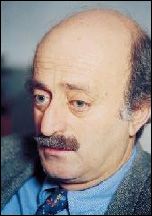 |
| Jumblatt: "There is a military ruling the government" |
"Army expenditure is the highest, at 13 or 14 percent," said Jumblatt in a separate interview. "The Army, the Internal Security Forces and the Intelligence services form a huge party of 300,000 or 400,000 people, in a country where democratic practice is, to say the least, weak."2
Jumblatt's assessment is frequently voiced by others in Lebanon. Ghassan Tueni, the editor of Lebanon's An-Nahar newspaper, said recently that Lahoud's style of government is similar to that of Fouad Shehab, the only other military chief-of-staff to serve as president of Lebanon (1958-1964). "Presidents with a military background 'naturally' tend to establish military regimes, because they trust their comrades, but view the civilians with suspicion," said Tueni. "Fouad Shehab contemptuously placed 'les civils' at the bottom of the social, cultural and moral pyramid--until he realized that perhaps the opposite was true: the only attempt to stage a military coup occurred during his military rule, and when the regime became even more militarized after the ill-fated coup, a 'parliamentary revolution' prevented him from getting reelected."3
Jumblatt, whose pro-Syrian Progressive Socialist Party (PSP) militia was a major participant in the Lebanese civil war, has become the unofficial spokesman of political elites in Lebanon who have been sidelined since Lahoud took office last year. According to most observers, power is slowly shifting from the pro-Syrian warlords who dominated previous government to the heads of security and intelligence services appointed by Lahoud. "If Lahoud is just counting on mingling the military with civilian affairs, and if he wants to rule out the old political class. . . this will lead to troubles inside Lebanon," said Jumblatt.
After years of subservience to Syria, Jumblatt was handsomely rewarded after Syrian military forces captured Beirut in October 1990. Damascus saw to it that electoral districts were gerrymandered (in violation of the Taif Accord) to ensure his reelection to parliament in 1992 and 1996 and that Jumblatt received cabinet-level positions in successive Lebanese governments.
After Syria's decision last year to abandon Jumblatt and other civil war collaborators in favor of a "new political equation" centered around Lahoud, a former army chief-of-staff, these perks suddenly disappeared. Jumblatt is not a member of the current cabinet. Indeed, Lahoud and Prime Minister Salim al-Hoss won't even consult him on serious matters of governance. Lahoud recently expropriated the historic Beiteddine palace in the Druze heartland that Jumblatt's forces captured during the civil war. Adding insult to injury, the Lebanese president made the palace his summer residence and removed a majestic statue of Jumblatt's father, Kamal, that had been erected at the site.
Nine senior officials of the previous government headed by former prime minister Rafiq Hariri have been arrested on corruption charges since Lahoud came to power. Lahoud "is using what is left of the so called justice (system) to harass people," said Jumblatt. While neither Jumblatt nor Hariri has been officially charged thus far, the current political climate does not rule out this possibility.
|
|
Jumblatt fails to recognize that Syria has always played off its local allies against one another so that its control over Lebanon never hinges upon the fate of one particular coalition. Rather than calling into question Syria's role as kingmaker in Lebanon, Jumblatt meets with Syrian officials at every opportunity in an effort to undermine their confidence in Lahoud. It is perhaps a sign of his growing desperation that he recently invited the Lebanese-American community to "pressure the US administration against supporting a military rule in Lebanon."
1 "Jumblatt Sees Lebanon Reliving Errors," Reuters, 8 August 1999.
2 "Walid Joumblatt: Druze Blues," ShuFiMaFi, 13 August 1999.
3 An-Nahar, 9 August 1999.
"If we want to reach a balance between expenditure and revenue," said Lebanese Finance Minister George Corm earlier this year, "then the government must increase the tax burden." Corm's tax increases have since come under severe criticism by a number of prominent Lebanese financial experts. While countries around the world are reducing the level of taxes to attract investment, say the critics, the Lebanese government is heading in the other direction.
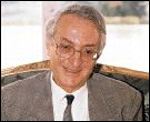 |
| George Corm |
The new tax increases also came under fire during a meeting of the Union of Professional Associations earlier this month. Many of the participants, which included physicians, pharmacists, lawyers, engineers and journalists, charged that the tax hikes would wipe out Lebanon's middle class.
"The new tax on professionals goes up to 21 percent, which is higher than the corporate tax," said Ghattas Khoury, head of the Doctors' Association.
Lebanese professionals are "the foundation of the economy" and "the cornerstone for the reemergence of the country's middle class," said Samir Doumit, the head of Beirut's Order of Engineers. Professionals must contend both with difficult economic conditions and a tax burden that is "more than double from last year," he added. The tax increases will "encourage those people to leave," added Antoine Qlimos, head of Beirut's Lawyers' Association.
Proposed Alternatives
Improve Collection
Many experts have insisted that efforts should first be made to improve collection at the current 10-percent tax ceiling before implementing any tax hikes. "If the government could improve tax collection on the 10-percent ceiling it could generate $533 million instead of the current $250 million," said Lebanese industrialist Marco Ayoub during the recent CAS meeting.
In Lebanon, however, where government officials often "overlook" the failure of influential constituents and political supporters to pay taxes, this may not be as easy as it sounds.
Privatization
This seems elementary--selling public utility companies will inject capital into the treasury--but Corm and other government ministers do not seem to have really grasped the meaning of the term. The government promised earlier this year to privatize public utilities, then proceeded to announce its intention to establish a public cellular telephone company. Because privatization of public utilities will inevitably result in the dismissal of excess personnel, many in the government lack the political will to take such potentially unpopular measures.
"We hold $270 million in private money which could be used in vital investment projects," said Francois Bassil, the chairman of Byblos Bank. "Privatizing electricity and telephone in a rational manner will help the government reduce part of the debt."
Sell off the Central Bank's gold reserves
"A drastic situation requires drastic measures, and the only way to solve the issue of the public debt is to sell off the Central Bank's gold reserves and to deposit the money generated from the sale in international banks as collateral to obtain long-term foreign currency loans at low interest rates," said Francois Bassil, the chairman of Byblos Bank. "People save their money in piggy banks for rainy days. We have reached our worst days and the government should act now." He emphasized that the sale should be done in several phases because "selling the entire gold reserves [at once] would reduce its value."
Bassil pointed out that the price of gold slid to 20-year-lows--around $250 an ounce-- after the Bank of England announced its intention to sell 25 tons of gold reserves a few months ago. This reduced the value of the 9.2 tons of gold held by the Lebanese Central Bank from $3.8 billion to $2.4 billion. "I don't see why we should sit on the reserves while the price of gold is falling,"said Bassil.
Lebanese Prime Minister Salim Hoss recently told Parliament that the government did not plan to sell gold reserves now or in the future. Only the government and Parliament are currently authorized to make decisions concerning the gold reserves. Freddie Baz, a chief strategist at Banque Audi, said that decisions in managing the country's gold reserves should really be in the hands of Riad Salameh, the governor of the Central Bank. "I strongly recommend that Salameh add gold to his power in addition to the management of local and foreign currency reserves," he said. "Let Salameh decide what to do with the gold. He can either sell it, keep it or even buy more gold."
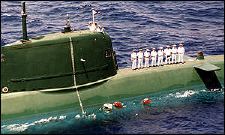 |
| Israel's new submarine arriving in port |
The Dolphin and its two sisters ships (due to arrive over the next year) were constructed in Germany by Howaldtswerke-Deutsche Werft AG (HDW) and Thyssen Nordseewerke (TNSW) and will replace three 23-year old Gal-class submarines currently in use by the Israeli navy. The new ships are said to be among the most advanced diesal-electric submarines in the world. The 1,550-ton submarines have a top speed of 20 knots and can dive to a maximum depth of only 200 meters, but are extremely quiet and maneuverable. They have a maximum range of 3,000 miles, allowing them to move undetected into areas as far away as the Persian Gulf. Moreover, each sub and its 35-member crew can stay underwater for up to a month without resupply. They are armed with advanced Harpoon sea-to-sea missiles. Defense analysts consider the Israeli subs to be far superior to those in Arab navies.2
|
|
Assistant Defense Minister Yisrael Tal, well-known in Israel as the "father" of the Merkava tank, has long been one of the most prominent voices in the IDF pushing for this transformation. "Israel must turn the sea into a part of its defense depth," wrote Tal, a retired major-general, in a book published earlier this year. "The designation of the Navy must change - no longer an assistance branch, but a branch of strategic deterrence." When the Navy's armament plans met opposition from the top brass in the late 1980's, Tal chaired a committee which examined the issue and submitted an unequivocal recommendation to then defense minister Yitzhak Rabin for the purchase of advanced submarines.3
The contract with Germany was briefly canceled due to its hefty price tag ($300 million per submarine), but was reinstated after Iraq demonstrated Israel's vulnerability to missile strikes by firing 39 Scud missiles at Tel Aviv during the 1991 Gulf War. Two thirds of the $900 million bill is now being paid by Germany (Israeli military sources said that Germany decided to do this as compensation for the role of German companies in developing Iraqi chemical weapons).
Over the last eighteen months the Israeli navy has also purchased new Sa'ar V missile corvettes and upgraded its Sa'ar 4.5 NIRIT-class fast attack craft.4
1 "State-of-the-Art Submarines Added to Israel's
Naval Arsenal," Jewish Telegraphic Agency, 28 July 1999.
2 Although Egypt has recently upgraded its R-class Romeos and purchased two former Royal Dutch Navy Zwaardvis-class submarines, both are outclassed by the high-tech equipment of Israel's new ships.
3 "The Defense Ministry's Elder Statesman," Ha'aretz,
3 August 1999 .
4 "Navy Force: Vital Future," Janes Defense Weekly, 3 February 1999.
Local sources have confirmed that Damascus has concluded a $2 billion arms contract with Russia to upgrade and augment Syrian land and air forces. The agreement marks the first significant arms shipment to Syria by Moscow since the fall of the Soviet Union in 1991. The United Arab Emirates and Iran have reportedly underwritten the deal for the financially destitute Syrian government (Moscow had insisted that Syria pay cash on delivery for the weapons and that its $12 billion debt to Russia be affirmed and rescheduled). The U.S. reportedly tried to block the agreement, but so far Moscow has shown no signs of backing down and risks losing $90 million in U.S. aid.
Syria's motivation for purchasing weapons which it can ill-afford at a time when it is allegedly on the brink of peace with Israel is the subject of much debate in Washington and Tel Aviv. Included in the deal are advanced Su-27 and MiG-29SMT fighter aircraft, as well as T-80 tanks. All three weapons systems are considerably more advanced than anything currently in the Syrian arsenal. In an effort to provide a framework for informed discussion of the strategic implications of this agreement, MEIB will profile each of these three weapons systems in this and two upcoming issues.
The MiG-29SMT
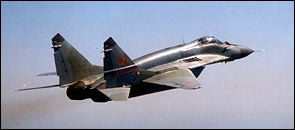 |
| The MiG-29SMT |
1 Current strength of the Syrian Air Force: 90 Su-22, 20 Su-24, 160 MiG-21, 90 MiG-23, 44 MiG-23BN, 30 MiG-25, and 20 MiG-29. See "Syria: Weapons of Mass Destruction Capabilities and Programs," Center for Nonproliferation Studies, 1999 [Online at http://cns.miis.edu/research/wmdme/syria.htm].
2 For more detailed information on the Mig-29SMT, see "Russia Sets New Standard for the MiG-29SMT," International Defense Review, 1 June 1999.
According to sources in Israel, the IDF has begun an extensive training program to prepare its units for Atomic-Biological-Chemical (ABC) warfare. Until recently, the Israeli military planners did not consider weapons of mass destruction to be a realistic national security threat. This assessment has been modified over the last few years in light of upgraded capabilities achieved by Syria, Iraq and other Middle East countries.
The new measures reflect the assumption that in future conflicts the IDF will confront enemy forces that possess and are prepared to use chemical-biological (CB) weapons against both civilians and soldiers. "In previous wars, it was clear there was a complete separation between the home front and the battlefield," said a senior army officer last month. "The introduction of long-range ground-to-ground missiles with nonconventional warheads forces us to adopt a new way of thinking."1
One IDF unit devoted entirely to ABC warfare is the Granite engineering corps company based in the Negev. This unit is specifically trained to identify the landing coordinates of an incoming missile, detect any CB agents present at the site and then decontaminate the area.
The highly mobile force uses armored personnel carriers equipped with a device called Sigal, which is used to locate and monitor toxic chemicals. In case the toxin can be conclusively identified at the site, the team takes samples of the substance to send back to a laboratory for precise identification. The unit also measures the concentration of the substance, wind direction and other factors to determine the danger posed to nearby areas.
The purification team then comes in to neutralize or remove toxins using M12 trucks equipped with large pumps. Two chemicals are commonly used to neutralize both biological and chemical weapons: STB, an acid, and DS2, a strong alkaline. Whereas chemical agents can be quickly neutralized, purification of biological agents can take weeks.
1Amos Harel, "Non-conventional Warfare Becomes Conventional," Ha'aretz, 20 July 1999.
According to Israeli intelligence sources, Iranian Revolutionary Guard (Pasdaran) units are reportedly begun training Hamas terrorists in a camp near Teheran. The connection was uncovered last month by Israel's Shin Bet internal intelligence service after three Hamas members were arrested after returning to the West Bank and Gaza strip from abroad. Under interrogation, the Hamas activists confessed that they had received guerrilla warfare training in Iran and were planning future operations against Israel. The three suspects are still being held and will soon stand trial in an Israeli military court.1
Israeli intelligence sources said that the recruits typically undergo two years of training in Iran in communications and sabotage. Afterwards, they are sent to a third country to build a cover story for their time abroad before returning to the occupied territories.2
The discovery of the camps comes amid reports that Iran has begun transferring $4.81 million each month to Hamas officials in Damascus.3 Earlier this year, Palestinian security forces arrested 40 members of Ezzedine al-Qassam, the underground military wing of Hamas, and reportedly uncovered documents indicating that the men had received funding from unspecified "parties" in Iran. "We have documents that they have already received $35 million to carry out sabotage operations against Israelis in the Gaza Strip," said Major-General Ghazi al-Jabali.4
Until the early 1990's, Iran and Hamas had relatively cool relations, largely because of doctrinal differences (Hamas is a Sunni Islamic group, while the Iran is predominantly Shi'ite). Iranian policy toward Hamas shifted in 1991, however, when the Madrid conference opened a new chapter in the Arab-Israeli peace process--Iran invited Islamist groups, including Hamas, to attend a "counter-conference" in Teheran. A common desire to thwart the peace process brought the two closer and closer together. In October 1992, a delegation led by Dr. Musa Abu Marzuk and other senior Hamas officials visited Teheran and met with Ayatollah Ali Khamenei, who reportedly promised to provide the group with $30 million annually. Shortly afterwards, Hamas opened an "embassy" in Teheran and Iran recognized Hamas as the "sole legitimate representative" of the Palestinians.
Reports of Hamas training camps in Iran began to surface during the mid-1990s, but it had been widely assumed after the 1997 election of President Mohammad Khatami that Iranian logistical support for the group had been phased out. Notwithstanding Khatami's alleged support for the peace process, Iran's clerical establishment is continuing its support for Hamas through the Revolutionary Guard, which operates independently of the Iranian military and is under the direct control of Khamenei.
1 "Hamas Terrorists Are Being Trained in Iranian Camp," Ha'aretz, 22 July 1999.
2 "Hamas Vows to Renew Attacks against Israel," The Jerusalem Post, 23 July 1999.
3 "Iran Funds Terror Group to Sabotage Peace Process," The Sunday Telegraph, 15 August 1999.
4 "Palestinian Police Link Hamas Men To Iran," Reuters, 4 February 1999.
According to local press reports, relations between the Syrian government and Palestinian Authority (PA) President Yasser Arafat have deteriorated to the lowest level in years.
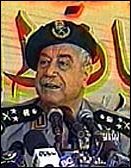 |
| Mustafa Tlass |
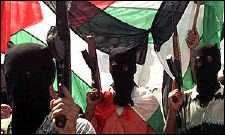 |
| Palestinian demonstrators in Gaza condemned the Syrian defense minister |
While Tlass is well-known for making extremely offensive comments in public,1 there is clearly an underlying tension in Syrian-Palestinian relations. There has been a relentless (though somewhat more tactful) stream of anti-Arafat diatribes in the official Syrian press. Moreover, President Hafez Assad recently rebuffed efforts by Egypt to convene a mini-summit that would include Syria, Jordan and the PA, insisting that he will not attend if Arafat is present.
To some extent, this tension can be traced back to Arafat's decision to sign the 1993 Oslo Accords with Israel without consulting the Syrians (or any other Arab state, for that matter). But with Syria itself apparently on the verge of renewing negotiations with Israel, Assad's anger toward Arafat cannot be explained merely as resentment for being left off the peace train.2
One clue as to the underlying tensions between the two leaders was the July 28 visit to the Gaza strip by Sumer Assad, the nephew of the Syrian president. Sumer's father, former Syrian Vice President Rifa'at Assad, launched a coup attempt against his brother during the 1980's. There is apparently some concern in Damascus that Sumer may be entertaining a similar power play after Assad's son and heir apparent, Bashar, takes the helm.
There is certainly every reason to believe that Arafat would be very happy with either Rifa'at or Sumer in charge of the Syrian government. After meeting and dining with the Palestinian leader, Sumer made it a point to publicly pay tribute to the "friendship" between his father and Arafat.
1 In February, Tlass outraged U.S. officials by referring to rioters who ransacked the U.S. embassy in Damascus as "brave youth whose actions dealt a slap to the United States."
2 Some have noted that Arafat and Assad simply do not have compatible temperaments. In a recent article in Al-Sharq al-Awsat, Syrian commentator Ghassan al-Imam stated that Assad "is a meticulous, organized, cautious and serene person . . . he is serious and keeps his word." Arafat, he said, "is less cautious and more prone to political U-turns." These differences, he added, make "a healthy relationship impossible to establish."
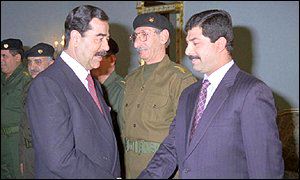 |
| Qusay Hussein and his father |
According to reliable sources, Saddam Hussein has designated his second-oldest son Qusay as his successor "in the event of an emergency." Qusay has also given the authority to supervise the army, the elite Republican Guards, and the intelligence agencies.1
Later in the month, according to Iraqi sources in Amman, Qusay reportedly replaced Izzat Ibrahim as deputy commander of the Iraqi army and head of military operations in the Northern Military Region.2
The reports appear to confirm recent speculation that 31-year-old Qusay has superseded his older brother, Uday, as Saddam's number two. Uday is a prominent personality in Baghdad nightclubs and has a well-deserved reputation for violence and cruelty that ultimately resulted in a 1996 assassination attempt, leaving him partially crippled. The word on the street is that Saddam decided around this time that his much-hated elder son was unfit (both physically and mentally) to be the future ruler of Iraq. Uday may not have fully accepted this verdict--his newspaper, Babel,condemned the reports of Qusay's appointment as having originating from "ignorant enemies" (Iraqi officials, however, have conspicuously not denied the reports).
Qusay, on the other hand, is mild-mannered and rarely seen in public. He is fluent in English and said to be a skilled administrator. Long considered to be the most trusted member of Saddam's inner circle, Qusay has been appointed to head highly sensitive projects in the past. For years, he has commanded the special security force charged with protecting his father and other top officials. After the defection of Hussein Kamel in 1995, Qusay and Saddam's private secretary, Abed Hamid Mahmoud, were put in charge of efforts to conceal prohibited Iraqi missile programs and weapons of mass destruction.
After a June 1996 coup attempt by Republican Guard officers, Saddam appointed Qusay to direct a special committee, comprised of the heads of the Mukhabarat, General Security (al-Amn al-Amm) and Military Intelligence, which was given unlimited powers to arrest and interrogate suspects implicated in the coup. An estimated 800 suspects were detained and tortured on Qusay's orders.3
Shortly after her appointment, U.S. Secretary of State Madeleine Albright publicly stated that the U.S. would oppose the lifting of economic sanction against Iraq as long as Saddam is in power. Whether this policy will apply to his son is anyone's guess.
1 Al-Sharq al-Awsat, 3 August 1999.
2 Al-Hayat, 10 August 1999.
3 For a detailed account of the failed coup attempt, see Andrew Cockburn, Out of the Ashes: The Resurrection of Saddam Hussein. New York: HarperCollins, 1999. pp. 219-230.
Middle East Television (METV), an affiliate of the Christian Broadcasting Network (CBN), is located in Marjayoun, the largest town in the Israeli-occupied security zone in south Lebanon. Lebanese security forces recently arrested Paul Younis, a member of the station's production staff, at an army checkpoint on charges of "collaborating with the enemy"and issued arrest warrants for several other news, editing, programming, and translation staff.
Earlier this month, MEIB editor Gary C Gambill interviewed METV station manager Wes Hylton to discuss this and other issues. The following are excerpts from this interview:
What kind of programming does METV broadcast?
Probably the best description of METV's programming is we're a typical American television station, which is a mix of comedies, movies, American sports, Christian religious programs.
In what language do you broadcast?
Predominantly in the original language, which is English for movies and sports, but we subtitle in both Arabic and Hebrew on the majority of the programs. We have some programs now that are original language, which would be English only, Arabic only, or Hebrew only.
What is your broadcast area?Well, we have two areas. One of them is terrestrial, meaning we broadcast by television transmitter. We had two transmitters, one of them is no longer operational with the town of Jezzine falling. We broadcast up and down the coast, approximately from Beirut almost to the edge of Egypt, and of course the local areas of northern Israel, southern Lebanon, Syria and Jordan. In the summertime, they can also see us a little bit as far as Cairo and Cyprus.
And then we have a second method of transmitting, which is on satellite. Now our satellite beam goes from the Middle of Turkey in the north down to the middle of Saudi Arabia, over to the edge of Libya and over to Teheran, and of course every place in between. And that signal is DBS, which means that on a very small dish, like a one meter dish, you can receive nearly a perfect quality signal.
Does the Lebanese government make any attempt to jam your broadcast signals, or can people in Lebanon tune in pretty regularly?
As far as we know, they make no attempt to jam it at all. Unfortunately, on the terrestrial broadcasts, which is on TV transmitters, we are on channel 12 as our primary channel. There is a station in Beirut which broadcasts at a lower power on the same channel and Syrian television also has a channel 12 transmitter. Where those signals overlap there is interference--they interfere with us, we interfere with them.
We've received reports that an employee at your station, Paul Younis, was recently arrested by Lebanese security forces. Can you elaborate on this incident?
Well, he was arrested on June 28 and held until about the first of August awaiting his appearance before the court. He was accused of a crime, I think it's military code 287, which means it was in some way collaboration with the enemy, the enemy being the state of Israel. So he was accused, since he was working with Middle East Television, of collaboration through the media with the enemy.
How many of your employees have been arrested or detained in the past?
Well, I'm guessing now because I don't really know, but I would say that half a dozen have actually been arrested temporarily, like for 24 hours or less. Usually they're interrogated, questioned and then released.None of them have been convicted or served prison terms?
No, they haven't, and even in Mr. Younis' case the court found that there was no evidence of collaboration, so he was released and cleared of all charges.
What is the position of the Lebanese Journalists Association on the harassment to which your employees have been subjected? Or do they even have a position?
I don't know that they have a position. Unlike us in the south, the media in Beirut is much more guarded about what they say because there's a fear of retaliation, maybe not so much from the government, but from the Syrians.
The indictment originally filed against Mr. Younis charged him with "working for media establishments which belong to Lahad's militia." Does the South Lebanese Army (SLA) exercise any control over your broadcasting?
No, they really don't. We're not funded or helped in any way by the SLA . . . they actually hardly interfere with us at all. There are instances when we will run a story that is critical, let's say, of some recent military action or decision. We'll get yelled at occasionally, you know, they'll be critical of us, but actually they make no attempt to say "write this" or "don't write this" or anything like that.
But, I should say too that when you're out shooting a story, if it's a story that someone doesn't want you to air, they will try to hide information, or they won't grant interviews, or will not allow access or something like that. So in a situation like that it's possible, in some ways, that they could influence our newscasts, but actually very little.
What other kinds of pressure have you encountered from the Lebanese government?
Well, the Lebanese government actually has been quite fair in most respects. I don't believe we've had any pressure from the government, except for harassment of travel with our employees. A lot of employees, of course, like to go to Beirut--they go to college there, or have family and friends there--so mostly its restriction of travel. I should also say that some employees are not granted passports when their passports expire. So that's also a way of harassment, but its always been a harassment against our employees.
Your station has been attacked by Hezbollah in the past, has it not?
That's correct. I'm not sure if we're targeted specifically. Anytime we've been caught in the crossfire, Hezbollah took credit for blowing up a station or military facility or something like that. We had a microwave site in a place called Jabal Toura several years ago, and it was attacked at the same time two other local SLA positions were attacked, and then the next day they took credit for attacking three SLA positions. So I think many times when they attack us, they're confused as to what we are.
Does your station plan to continue operating once Israeli forces have withdrawn from south Lebanon?
You know, that's an unknown. We would like to. We haven't met with much hostility from the new government in Beirut. I've spoken with people at the ministry of communications and tried to make contact with other government folks, like the prime minister's office, and basically they say listen, you're part of the security zone and your situation will be resolved when the security situation is resolved. We took it to mean that they wouldn't give us an answer yes or no until Israel withdraws and they reestablish control in south Lebanon. So it's an unknown factor right now whether we can continue after the SLA and IDF are withdrawn or dissolved. We would like to. We've been here for seventeen years and we'd like to operate another seventeen years, [but] we don't know if that's possible or not.
As an American-owned station, has METV received any kind of protection or assistance from the U.S. State Department?
In a situation like this area, their goal is to protect American citizens. They're very responsive concerning me, very concerned because I'm an American citizen. I find it very frustrating, though, that when a situation like [the arrest of] Mr. Younis [arose], they were unhelpful at all. They were very unsympathetic and they termed it an internal Lebanese affair that they wouldn't get involved with. So, our relationship with the state department is good, but they have guidelines that they must operate under and they generally try to avoid getting involved in what they consider an internal affair.
Members of U.S. Spy Network Reportedly on Trial in Lebanon (15 July 1999)
Iranian Military Reportedly Plotting Coup (16 July 1999)
Bashar Assad May Head Syrian Negotiations with Israel (27 July 1999)
U.S. Officials on Alert for Terrorist Attack (28 July 1999)
Motorist in Cyprus Blows Cover of Israeli Agents (29 July 1999)
Bin Laden Preparing to Leave Afghanistan (30 July 1999)
Iraqi Justice Minister Visits Saudi Arabia (1 August 1999)
Pakistani Islamist Leader Threatens "War against Americans" (3 August 1999)
Israel, U.S. Pour Additional $46.6 Million into Air Defense Laser (4 August 1999)
Saudis May Be Trying to Purchase Nukes (4 August 1999)
Arafat Threatens Jihad against Israel (6 August 1999)
Bodansky: Bin Laden Believed to Have up to 20 Tactical Nukes (6 August 1999)
Bashar Assad Meets with Lebanese President (8 August 1999)
SLA Abandons Position in South Lebanon (9 August 1999)
Lebanese Army Officer Accused of Spying for Mossad (9 August 1999)
IDF Uncovers Hezbollah Informant Network (10 August 1999)
Cyprus Releases Israeli Spies (12 August 1999)
Members of U.S. Spy Network Reportedly on Trial in Lebanon
15 July 1999
According to local sources, Lebanon's Permanent Military Court recently began the trial of three people accused of working for the intelligence service of a "foreign country"--believed to be the United States. One of the suspected agents is a Jordanian woman who allegedly tried to gather information about the whereabouts of Hasan Izz-al-Din, who is accused by the U.S. government of participating in the hijacking of a TWA airliner to Beirut in the mid-1980s in which a crew member was killed.
Iranian Military Reportedly Plotting Coup
16 July 1999
According to an article published today in the Paris-based Arabic magazine Al-Watan al-Arabi, four leading Iranian generals recently sent a secret letter to U.S. officials indicating that the Iranian military is considering a coup to oust Iran's cleric-led government in the event that the reform efforts of President Mohammad Khatami are unsuccessful. Three of the generals currently serve in the air force, navy and army, while the fourth is retired. The article states that U.S. authorities are treating the letter with "the utmost seriousness."
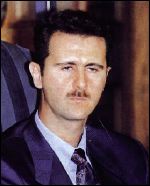 |
| Bashar Assad |
According to a report in today's edition of Ma'ariv, Syrian President Hafez Assad is considering the appointment of his son Bashar to head the Syrian negotiating team in future peace talks with Israel in order to help secure the status of his future successor. According to the report, Israeli intelligence agents have already begun collecting information about Bashar to brief their negotiating team.
U.S. Officials on Alert for Terrorist Attack
28 July 1999
CNN reported today that the Pentagon may temporarily suspend public tours amid heightened concerns of a terrorist attack by Saudi militant Osama bin Laden. Earlier this month, the FBI halted public tours of its headquarters do to similar concerns. Pentagon officials recently warned that the U.S. is not prepared for a biological attack by terrorists which, according to Defense Secretary William Cohen, could cause "a plague more monstrous than anything we have experienced."
Motorist in Cyprus Blows Cover of Israeli Agents
29 July 1999
According to an article in the Greek-Cypriot newspaper Phileftheros published today, an angry motorist in Cyprus inadvertently exposed Israeli intelligence agents using a car with his license number for undercover operations on the island. The motorist, who had received numerous fines for parking violations despite not having driven his disabled Volvo in several months, spotted a Mazda 323 with an identical license plate and followed it to the Israeli embassy. News of the incident soon became public, causing an uproar among members of the Greek-Cypriot parliament. "We do not like spies in our country," said Marios Matsakis, a deputy of the opposition party DIKO. The scandal comes just five months after Cyprus imprisoned two Israelis for entering a restricted military area.
Bin Laden Preparing to Leave Afghanistan
30 July 1999
According to a report today by the independent Afghan Islamic Press (AIP), exiled Saudi militant Osama bin Laden is preparing to leave Afghanistan and seek asylum in another country. Citing sources close to bin Laden, AIP said that "Osama has decided to leave Afghanistan because of fears of expected attacks from the United States and also because of how much more Afghanistan can suffer because of him." Bin Laden, who is accused of ordering the bomb attacks against U.S. embassies in Kenya and Tanzania last August, currently resides at a secret base in the eastern Afghan town of Jalalabad.
Iraqi Justice Minister Visits Saudi Arabia
1 August 1999
Iraqi Justice Minister Shabib al-Malki arrived in Saudi Arabia today and met with Crown Prince Abdullah to discuss a regional anti-terrorism pact. This marked the highest level visit by an Iraqi official since Saudi Arabia broke relations with Iraq after it invaded Kuwait in 1990.
Pakistani Islamist Leader Threatens "War against Americans"
3 August 1999
A U.S. embassy officer held a 90-minute meeting with Maulana Fazlur Rehman, the leader of Pakistan's radical Jamiat Ulema-i-Islam party who recently threatened to wage "war against Americans" in retaliation for any U.S. attack against Osama bin Laden. "The purpose of this meeting was to express concern over threats by Maulana Fazlur Rehman and party members," said a U.S. embassy spokesman. Rehman said afterwards that he stood by his threats. "I replied, if because of you people, we are not safe in our land, then you too should not feel safe in our territory."
Israel, U.S. Pour Additional $46.6 Million into Air Defense Laser
4 August 1999
Gerda Sherril, a spokeswoman for the U.S. Army Space and Missile Defense Command, said today that Israel and the U.S. have agreed to spend an additional $46.6 million to continue development of the Tactical High Energy Laser Weapon, which is designed to targets and destroy incoming short-range projectiles, such as the Katyusha rockets used by Hezbollah. The program has cost $130.8 million dollars since it began in 1996.
Saudis May Be Trying to Purchase Nukes
4 August 1999
According to a report published today in the Guardian, a senior British official expressed "concern" that Saudi Arabia may be seeking to buy nuclear weapons. Suspicions were first raised in May, when Saudi Defense Minister Prince Sultan bin Abdul Aziz toured Pakistan's secret nuclear facilities. Sultan reportedly visited a uranium enrichment plant and missile production facility, and was briefed by A.Q. Khan, the chief architect of Pakistan's nuclear weapons program. Western officials say that Saudi Arabia may have agreed to finance the program.
Arafat Threatens Jihad against Israel
6 August 1999
According to today's Jerusalem Post, Palestinian Authority (PA) President Yasser Arafat said during a speech in Ramallah that his people will "continue with our struggle, our jihad . . . and once again enter the city of Jerusalem as the Moslems did for the first time." Israeli Foreign Minister David Levy appeared on Channel 1 news shortly afterwards to say that "this is a different Arafat . . . this style does not advance the peace, and it would be beneficial if he were to get off this path. We are not going to accept a situation whereby someone threatens Israel. This will undoubtedly raise within every Israeli question marks about the future. This is not peace"
Bodansky: Bin Laden Believed to Have up to 20 Tactical Nukes
6 August 1999
Yosef Bodansky, a researcher for the House Task Force for Counterterrorism and author of a new book on Osama bin Laden, told a news conference today that the renegade Saudi terrorist is believed to have up to 20 suitcase size tactical nuclear weapons. "The Russians believe that he has a handful [of nuclear weapons], the Saudi intelligence services . . . believe that he has in the neighborhood of 20," said Bodansky. "He is looking for and recruiting former Soviet special forces in learning how to operate the bombs behind enemy lines."
Bashar Assad Meets with Lebanese President
8 August 1999
Bashar Assad, son and heir apparent of Syrian President Hafez Assad, and Syrian intelligence chief Ghazi Kanaan visited Beirut to meet with Lebanese President Emile Lahoud. According to an official statement three discussed "continued cooperation and coordination between Syria and Lebanon in all areas."
SLA Abandons Position in South Lebanon
9 August 1999
AFP reported today that the Israeli-allied South Lebanon Army (SLA) militia has withdrawn from its outpost at Kantara in the security zone and redeployed to more defensible terrain. Two months ago, the SLA withdrew from the Jezzine enclave north of the security zone, which it had controlled since 1985.
Lebanese Army Officer Accused of Spying for Mossad
9 August 1999
A Lebanese army officer assigned to a security team guarding the residence of Parliament Speaker Nabih Berri's home was arrested tonight at his home near Sidon while communicating with Israeli Mossad agents via a wireless transmission device. Prior to joining the army, First Adjutant Hussein Ali Alayyan was a high-ranking member of Berri's Amal militia--at one time, he was in charge of Amal operations against Israel in the eastern sector of the security zone
IDF Uncovers Hezbollah Informant Network
10 August 1999
Israelwire reported today that Israeli security forces have uncovered a major Hezbollah informant network earlier this month. At least ten Lebanese civilians were arrested for allegedly providing Hezbollah with detailed intelligence data pertaining to IDF and South Lebanon Army (SLA) army operations. A hidden weapons cache--said to be the largest uncovered in recent years--was uncovered in connection with the arrests.
Cyprus Releases Israeli Spies
12 August 1999
Cypriot President Glafcos Clerides pardoned two Israeli intelligence agents today who had imprisoned for five months because their continued detention "would no longer serve the national interest." Udi Hargov, 37, and Igal Damary, 49, were arrested in November 1998 and convicted of entering a prohibited military area. Israel, which had previously admitted that the two men belonged to its Mossad intelligence service, issued a statement thanking Clerides for their release.